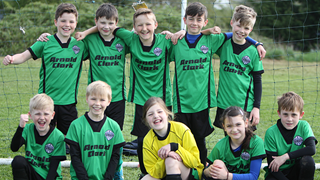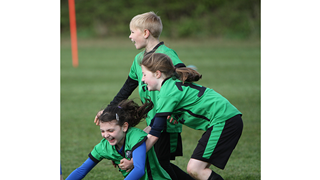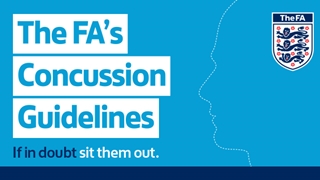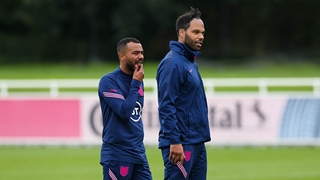
Steve Hawkins, level two coach at Tarvin AFC, shares how the level one coaching course develops well-rounded young people - as well as footballers
"I got into coaching like many other people – because my kid wouldn’t be able play football unless there was a Level 1 coach to run the team. I wasn’t an active football person, my background’s in falling off mountains! I completed the Level 1 course in July 2016, which is prior to the FA revamping the format based on the work to create the England DNA.
After doing my Level 1 and running the team on my own for a season I thought, ‘Is this it? Is this as good as it gets?’ I’d done the Level 1 course, I should be well equipped, but something didn’t feel right, something was missing. I didn’t feel a common connection between the game and what I was coaching alongside other coaches.
There was also a realisation of the impact I was going to have on these players' future involvement in the game and how they would develop as individuals - that was a turning point. That’s when I found the DNA and with the resources that were available on Hive, the coaches forum, it started to take hold. At the same time I also got involved with the FA Mentoring programme and signed up for the Level 2 qualification.
The Level 1 course was all about creating a positive environment, keeping the kids safe, whilst being able to deliver the technical element using the 12 drills, it felt a bit like ‘use those drills and you’ll be fine’. Don’t get me wrong, it was all good information, the tutors were great, but then you look at how the course is structured now, and you see it’s a step up.
I work with the club's Level 1 coaches in a mentoring capacity, what I hear and see more now is the coaches making the connection with the Principles of Play. The 12 practices are still valid, but now the Level 1 coaches can see how they can be used / adjusted to fit into the session they own. That’s been achieved by going back to basics of developing a practice from the beginning, and that starts with a clear purpose/objective for the session.
Now I’m seeing sessions with a clarity of purpose that are also measurable on several levels, so the review makes more sense, and if session delivery is right then you can work on getting the right technical content in, after all that’s why we’re here. The other key is that it gives those coaches who haven’t really thought about the technical components of the game a clear framework to work with, to structure their thinking and language, that’s an immediate boost to those coaches who hadn’t considered a role in coaching and may have been a little apprehensive.
So how does this benefit my players? Kids are very different, they all want something different, but at the heart of it is that they want to enjoy their football and get better. The ones who are totally immersed in football want to hear about those principles of play, they want the technical information to be able to relate to it, use the same language. At the other extreme the ones who aren’t die hard footballers want to understand the game, so they can talk about it on an equal footing back in the school playground, it gives them a common language and credibility.
A few of us go and watch Chester FC and they now start to look at what the players are doing during the “In Possession” and “Out of Possession” phases, they can actually relate to what they are seeing on a pitch to the sessions we run, again that’s a very powerful connection. By bringing those elements into the Level 1 syllabus it encourages coaches to make that connection for the players, we've made understanding the game more accessible and more connected for the young players, they feel like they're able to become their footballing idols, whether that’s Salah, Pogba or Iwan Murray.
If we then take the four corner model we see lots of examples of players using their strengths to compensate for their weaknesses in the model. The magic is that we can use that to our advantage, by talking about how they see their peers. They recognise the best players aren’t necessarily the most technically gifted ones. They also start to realise to become better players they need to tick the other boxes as well.
We’ve got a player who is technically weaker than the rest, where he excels is his thinking about the game, he knows the right thing to do, so he’s powered up that side to give him more time and space to execute the technical, the player has benefited from his understanding of the bigger picture. I’ve got a very technical player, where he needs to improve in the social area, he’s realising he can’t win the game on his own, he needs to work with the team, he needs them as much as they need him. The penny drops, they use their strengths, but at the right time with the right language we can get them to appreciate where they need to develop.
By embracing those elements from the Level 1 course and bringing them to the team it makes a difference on match days. The U11 team are now more aligned on match days, the less technical players are able to feel part of the process of winning, consciously they play the game differently, sub-consciously they are actually taking more risks, trying out new things, they're getting better.
We’ve also got them thinking about success in a different way, defining success, so when the result doesn’t go our way, they reflect on why and find success, whether it’s applauding someone’s effort, tactical awareness, physical attributes, we’ve got that social groove going on and they then support each other.
Even Player of the Match is done by the them, who am I to say who it should be? I have a view but it’s their team, they need to build it, we just provide the framework. Interestingly it’s not the player who’s scored the goals, or the keeper with cat-like reflexes, it’s the one who has exceeded their ability across a given corner. Though it’s not easy to explain the 4 corners to an U11 group, they do recognise when someone is exceeding in an area, so as a result Josh “The Rock”, as he’s now known, gets the recognition for developing and exceeding expectations, the kids recognise they’re in it together and supporting each other will bring a greater reward.
What’s also covered in the Level 1 course is how to work with parents. I oversee the U5 and U6 age groups and I make a very conscious effort with the parents not just to talk about the club and its approach but the England DNA, the four corner model, how it works across all levels of the association, how it was created and how it underpins everything we're working towards. I talk about the competitive nature – that we’re here to coach footballing skills so their kids can play in 20 years’ time.
At the same time it’s not just about making competent footballers but developing good, individual people, we do that through the 4 corners, the 5 Cs. I talk about the fact we’re trying to make the kids better people as well as better players, it demonstrates that we’re looking after their kids with a holistic approach.
As a coach if you’re using the England DNA, the 4 corner model, the Principles of Play when communicating with parents it sends a powerful message, one that’s got the backing of the whole FA, that makes your job as a coach far easier.
The Level 1 course equips coaches with a far richer tool-set, it’s backed up with a huge knowledge base on Hive from the very heart of the FA, by those involved in creating the DNA. It gives coaches the platform to take their players on a positive footballing journey, that parents can relate to as well and it's a learning adventure for all."
Been inspired? Sign up to become a level one coach.
Watch the video below to discover how to get into coaching:










